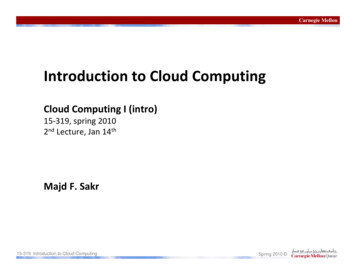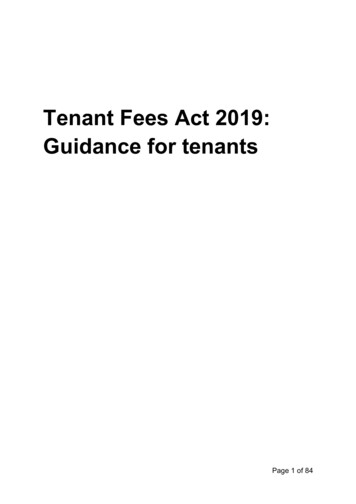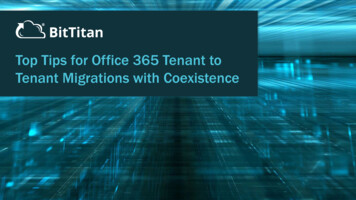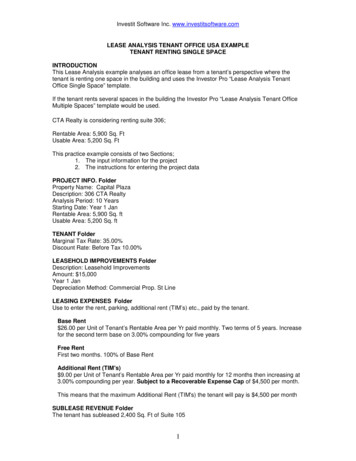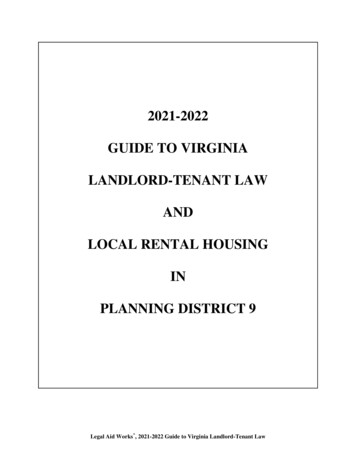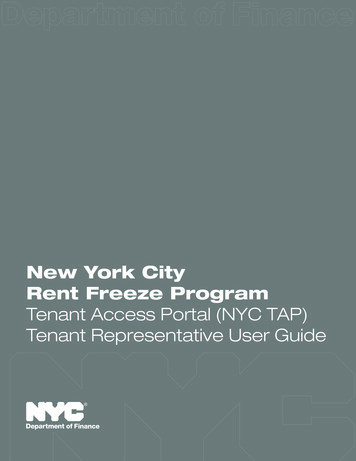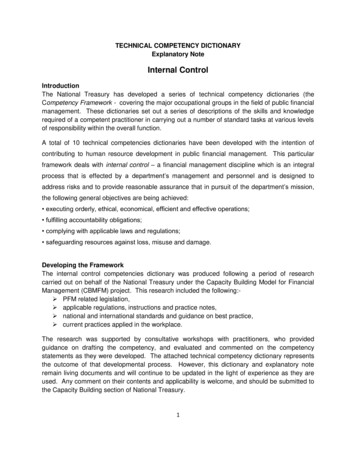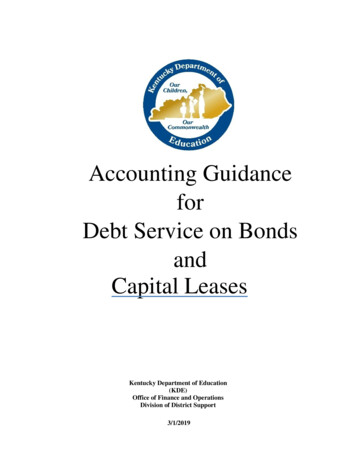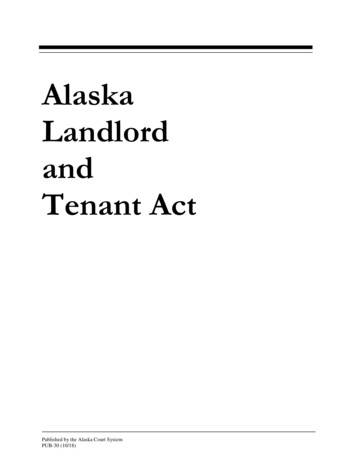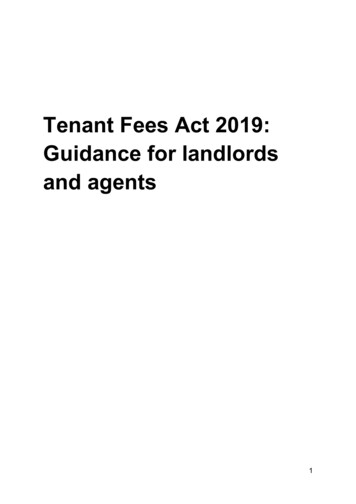
Transcription
Tenant Fees Act 2019:Guidance for landlordsand agents1
ContentsABOUT THE BAN .4What fees can I ask a tenant to pay? . 4When does the ban apply? . 8What does this mean for existing tenancy agreements? . 8Who does the ban apply to? . 8ENFORCEMENT . 10Q. Who will carry out enforcement of the Tenant Fees Act?. 10Q. Who are Trading Standards? . 10Q. Do tenants have any other enforcement options? . 10Q. What is a lead enforcement authority?. 10Q. What evidence will I need? . 10FINANCIAL PENALTIES AND CONVICTIONS . 11Q. What is considered to be a breach of the ban? . 11Q. When will enforcement authorities decide to impose a financial penaltyas an alternative to prosecution? . 11Q. What factors will enforcement authorities take into account whendeciding the appropriate level of financial penalty? . 12Q. Can a tenant receive compensation under the ban?. 12Q. Will I be able to appeal an enforcement authority’s decision to impose afinancial penalty for breach of the ban? . 12Q. If I receive a financial penalty for breaching the ban, will I be added tothe database of rogue landlords and property agents? . 12Q. If I’m convicted of an offence under the ban, will I be added to thedatabase of rogue landlords and property agents?. 12Q. If I breach the ban on fees, can the local housing authority apply to theFirst-tier Tribunal for a banning order? . 13Where can I get more information about letting a property in England? . 13ANNEX A – TENANT FEES BILL Q&A .14Which types of tenancy does the ban apply to? . 18PROHIBITED PAYMENTS .19VIEWING FEES . 19TENANCY SET-UP FEES . 19TENANCY CHECK-OUT FEES. 212
THIRD PARTY FEES . 23PERMITTED PAYMENTS .26RENT . 26TENANCY DEPOSITS . 28DEPOSIT OPTIONS . 32HOLDING DEPOSITS . 33DEFAULT FEES AND DAMAGES PAYMENTS . 45CHANGES TO A TENANCY . 54EARLY TERMINATION FEES . 56OTHER PAYMENTS . 58COVID-19 IMPACT ON THE TENANT FEES ACT . 603
ABOUT THE BANPlease note: this guidance applies to England only.What fees can I ask a tenant to pay?You cannot require a tenant (or anyone acting on their behalf or guaranteeing theirrent) to make certain payments in connection with a tenancy. You cannot requirethem to enter a contract with a third party or make a loan in connection with atenancy.The only payments you can charge in connection with a tenancy are:a) the rentb) a refundable tenancy deposit capped at no more than five weeks’ rent wherethe annual rent is less than 50,000, or six weeks’ rent where the total annualrent is 50,000 or abovec) a refundable holding deposit (to reserve a property) capped at no more thanone week’s rentd) payments to change the tenancy when requested by the tenant, capped at 50, or reasonable costs incurred if highere) payments associated with early termination of the tenancy, when requestedby the tenantf) payments in respect of utilities, communication services, TV licence andcouncil tax; andg) A default fee for late payment of rent and replacement of a lost key/securitydevice, where required under a tenancy agreementIf the fee you are charging is not on this list, it is a prohibited payment and youshould not charge it. A prohibited payment is a payment outlawed under the ban.If you are uncertain as to whether a charge is permitted, you should considercontacting Citizens Advice or obtaining legal advice. You could contact your localtrading standards authority or the lead enforcement authority.You cannot evict a tenant using the section 21 eviction procedure until youhave repaid any unlawfully charged fees or returned an unlawfully retainedholding deposit. All other rules around the application of the section 21evictions procedure will continue to apply.In the Act, “in connection with a tenancy” is defined as requirements: by a landlord or letting agent in consideration of, or in consideration ofarranging for, the grant, renewal, continuance, variation, assignment, novationor termination of a tenancy4
on entry into a tenancy agreement, or an agreement relating to a tenancy witha letting agent, containing provisions requiring the tenant to do any of thosethingspursuant to a provision of a tenancy agreement, or pursuant to an agreementrelating to a tenancy with a letting agent, which requires or purports to requirethe person to do any of those things in the event of an act or default of theperson or if the tenancy is varied, assigned, novated or terminated; andas a result of an act or default related to the tenancy unless pursuant to, or forbreach of, a tenancy agreement, or an agreement relating to a tenancy with aletting agent; andin consideration of providing a reference for a former tenantYou are permitted to ask a tenant to pay:a) the rentYou should agree the amount of rent to be paid with the tenant when agreeingto let the property. The rent should be paid at regular, specified intervals. Theamount charged will usually be equally split across the tenancy. In the firstyear of the tenancy, you must not charge more at the start of the tenancycompared to a later period.For example, you cannot require a tenant to pay 800 in month one and 500in month two onwards – the additional excess of 300 in month one will be aprohibited payment. But, if appropriate, you may decrease the rent (withoutpenalty) during the first year if agreed by the tenant once the tenancy hasstarted or under a rent review clause that enables both rent increases anddecreases.b) a refundable tenancy deposit (capped at no more than five weeks’ rentwhere the total annual rent is below 50,000, or six weeks’ rent wherethe total annual rent is 50,000 or above)You may ask a tenant to pay a tenancy deposit as security for theperformance of any obligations, or the discharge of any liability arising underor in connection with the tenancy for example in case of any damage orunpaid rent or bills at the end of the tenancy. You are not legally required totake a deposit. In any case, you must not ask for a deposit which is more thanfive weeks’ rent where the annual rent is less than 50,000. If the annual rentis 50,000 or greater the tenancy deposit is capped six weeks’ rent. Anyamount above this will be a prohibited payment.Any deposit you request must usually be protected in one of the threeGovernment backed tenancy deposit schemes within 30 days of taking thepayment. A landlord must provide the tenant with information as to where andhow their deposit is protected within the same timeframe of when the deposit5
is received. The deposit is the tenant’s money and you will need to provideevidence to substantiate any deductions from the deposit at the end of thetenancy if challenged.c) a refundable holding deposit (capped at no more than one week’s rent)You may ask a tenant to pay to demonstrate a commitment to rent theproperty whilst referencing checks take place. You cannot ask a tenant for aholding deposit which is more than one week of the total rent for that property.If you ask for a holding deposit which is above one week’s rent, this will be aprohibited payment.You should only accept one holding deposit for one property at any one time.If you accept more than one, this will be a prohibited payment unless youhave been permitted to retain an earlier holding deposit. You should stopadvertising a property once a holding deposit has been agreed to be paid.You must refund the holding deposit where a tenant later enters into atenancy agreement, the landlord decides not to rent the property, anagreement is not reached before the ‘deadline for agreement’ (and thetenant is not at fault), or if you impose a requirement that breaches the banand/or act in such a way that it would be unreasonable to expect a tenant toenter into a tenancy agreement with you (i.e. including unfair terms in atenancy agreement or harassment etc.)The ‘deadline for agreement’ for both parties is usually 15 days after aholding deposit has been received by a landlord or agent (unless otherwiseagreed in writing).You can only retain a tenant’s holding deposit if they provide false ormisleading information which reasonably affects your decision to let theproperty to them (i.e. calls into question their suitability as a tenant, this caninclude their behaviour in providing the false or misleading information), theyfail a Right to Rent check, withdraw from the proposed agreement (decide notto let) or fail to take all reasonable steps to enter an agreement (i.e.responding to reasonable requests for information required to progress theagreement) when the landlord and/or agent has done so. Where you wish toretain the holding deposit, you must set out in writing the reason for this within7 days of deciding not to enter the agreement or the ‘deadline foragreement’.d) default fees (for late payment of rent and replacement of a lostkey/security device, where required under a tenancy agreement)You can only charge a tenant a default fee where this has been written intothe tenancy agreement and this is for a late payment of rent (which is more6
than 14 days overdue) or a lost key/security device giving access to thehousing.The fee will be a prohibited payment where this exceeds interest at more than3% above the Bank of England’s annual percentage rate for each day that thepayment is outstanding (for a late rent payment) or the reasonable costsincurred by the landlord or agent (for a replacement key/security device). TheAct does not affect any entitlement to recover damages for breach of contract.e) changes to the tenancy (capped at 50 or reasonable costs if higher)Where a tenant requests a change to the tenancy agreement (e.g. a changeof sharer or permission to keep pets on the property) you are entitled tocharge up to 50 for the work involved in amending the tenancy agreement orthe amount of your reasonable costs if they are higher. It is good practice for alandlord or agent to agree to reasonable requests to vary the tenancyagreement. The general expectation is that the charge will not exceed 50.You should provide evidence to demonstrate the reasonable costs of carryingout the work if you wish to charge above 50. Any charge that exceeds thereasonable costs you have incurred will be a prohibited payment.Please note: the provisions on a change to the tenancy does not apply to arenewal or to the length of the tenancy. Since 1 June 2019, agents andlandlords have not been able to charge for a renewal of a tenancy under theAct.f) early termination (capped at the landlord’s loss or agent’s reasonableincurred costs)If a tenant requests to leave before the end of their tenancy you are entitled tocharge an early termination fee. This must not exceed the financial loss that alandlord has suffered in permitting, or reasonable costs that have beenincurred by the agent in arranging for, the tenant to leave early.This usually means that a landlord must not charge any more than the rentthey would have received before the tenancy reaches its end. It is goodpractice to agree to any reasonable request to terminate the tenancyagreement early. If there are no missed rent payments, we encourage you tonot charge any early termination fees unless you can demonstrate throughevidence to the tenant that specific costs have been incurred (e.g. marketingand referencing costs). Any payment that exceeds the landlord’s financial lossor an agent’s reasonable costs will be a prohibited payment.g) council tax, utility and communications servicesTenants are still responsible for paying bills in accordance with the tenancyagreement, which could include council tax, utility payments (gas, electricity,7
water) and communication services (broadband, TV, phone). There isassociated consumer protection legislation which prohibits landlords fromover-charging for these services. The Office of Gas and Electricity Markets,‘OFGEM’, fixes maximum resale prices under section 44 of the Electricity Act1989, section 37 of the Gas Act 1986, and the Water Resale Order 2006governs the maximum price for water.When does the ban apply?It depends on when a tenancy agreement was entered into. The ban is beingintroduced in two stages.1. As of 1 June 2020, the ban on fees will apply to all applicable tenancies andlicences to occupy housing in the private rented sector, regardless of whenthey were entered into. Landlords are responsible for the costs associatedwith setting up, renewing or ending a tenancy (i.e. referencing, administration,inventory, renewal and check-out fees).You will not be able to charge anyfees after this date (apart from those fees which are expressly permittedunder the ban – see above).What does this mean for existing tenancy agreements?If a tenancy agreement was entered before 1 June 2019, you can continue torequire a tenant to pay fees written into that agreement (e.g. check-out or renewalfees) until 31 May 2020.After 1 June 2020, the term requiring that payment will no longer be binding. Shouldyou, in error, ask a tenant to make such a payment, you should return the paymentimmediately and must return this within 28 days. If you do not return the paymentwithin 28 days, you will be treated for the purposes of the Act as having required thetenant to make a prohibited payment (a payment that is outlawed under the ban).You do not need to return any amount of tenancy deposit that is over the cap fortenancy agreements that were entered into before the Tenant Fees Act came intoforce. For more information on this, please read the Tenancy Deposit section.Who does the ban apply to?The ban applies to all assured shorthold tenancies, tenancies of studentaccommodation and licences to occupy housing in the private rented sector inEngland. The majority of tenancies in the private rented sector are assured shortholdtenancies.In this guidance ‘tenant’ includes licensees. ‘Relevant persons’ are any personsacting on behalf of a tenant or licensee or guaranteeing the rent.8
Please note: certain licences to occupy are excluded from the Tenant Fees Act2019, such as those granted under Homeshare arrangements (provided that thenecessary conditions apply).Local housing authorities, the Greater London Authority or a person or organisationacting on their behalf are excluded from the definition of relevant person under theAct and can continue to make payments in connection with a tenancy when actingon behalf of a tenant or guaranteeing their rent.9
ENFORCEMENTQ. Who will carry out enforcement of the Tenant Fees Act?Trading Standards authorities have a duty to enforce the ban but district councils thatare not Trading Standards authorities will also have power to enforce if they chooseto do so. You can find your local Trading Standards authority here.Q. Who are Trading Standards?Trading Standards are based within local authorities and enforce consumer rights.They can determine whether a tenant or relevant person has been charged anunlawful or unfair fee by a landlord or agent and can issue a fine for breach of theban, if this has been established.Q. Do tenants have any other enforcement options?The Act also makes provision for tenants or relevant persons to be able to recoverunlawfully charged fees through the First-tier Tribunal and, importantly, preventslandlords from recovering possession of their property via the section 21 evictionprocedure until they have repaid any unlawfully charged fees or unlawfully retainedholding deposit. Tenants can also seek repayment through the relevant redressscheme (where this concerns an agent).Q. What is a lead enforcement authority?The Secretary of State (i.e. the Government) can arrange for a lead enforcementauthority whose duty it is to oversee the operation of the tenant fees ban and anyother relevant letting agency legislation. The Secretary of State may themselves actas lead enforcement authority.Bristol City Council is currently appointed as the lead enforcement authority,operating as the National Trading Standards Lettings and Estate Agency Team.Q. What evidence will I need?You should keep any evidence of payments that you have requested a tenant tomake; this could be: tenancy or pre-tenancy agreements any other relevant paperwork receipts and invoices bank statements correspondence from the tenant – emails, letters, texts notes that you made at the time or shortly after any conversation with a tenant10
FINANCIAL PENALTIES AND CONVICTIONSOverviewA breach of the legislation will usually be a civil offence with a financial penalty of upto 5,000, but if a further breach is committed within 5 years of the imposition of afinancial penalty or conviction for a previous breach this will be a criminal offence.The penalty for the criminal offence, which is a banning order offence under theHousing and Planning Act 2016, is an unlimited fine.Where an offence is committed, local authorities may impose a financial penalty ofup to 30,000 as an alternative to prosecution. In such a case, local authorities willhave discretion whether to prosecute or impose a financial penalty. Where a financialpenalty is imposed this does not amount to a criminal conviction.A breach of the requirement to repay the holding deposit is a civil offence and will besubject to a financial penalty of up to 5,000.Q. What is considered to be a breach of the ban?Each request you make for a prohibited payment is a breach. For example, thefollowing would be considered multiple breaches: charging different tenants under different tenancy agreements prohibited feescharging one tenant multiple prohibited fees for different services at differenttimescharging one tenant multiple prohibited fees for different services at the sametimecharging one tenant one total prohibited fee which is made up of differentseparate prohibited requirements to make a payment e.g. 200 requested forarranging the tenancy and doing a reference check would represent multiplebreaches.Where you are being fined for multiple breaches at once, and you have notpreviously been served a financial penalty, the financial penalty for each of thesebreaches is limited to up to 5,000 each.Q. When will enforcement authorities decide to impose a financial penalty asan alternative to prosecution?Enforcement authorities are expected to develop and document their own policy onwhen to prosecute and when to issue a financial penalty of up to 30,000 and shoulddecide which option they wish to pursue, on a case-by-case basis, in line with thatpolicy. Local authorities must have regard to statutory enforcement guidance issuedby the lead enforcement authority or Secretary of State.11
Q. What factors will enforcement authorities take into account when decidingthe appropriate level of financial penalty?Enforcement authorities have discretion when determining the appropriate level offinancial penalty within the limitations set out by the Act.Enforcement authorities are expected to develop and publish their own policy ondetermining the appropriate level of civil penalties to impose. Generally, we expectthe enforcement authority to consider each breach on a case by case basis and forthe maximum amount to be reserved for worst offenders.The actual amount levied in any particular case should be fair and proportionatereflecting the severity of the offence as well as taking in to account the landlord oragent’s previous record of offending.Q. Can a tenant receive compensation under the ban?A tenant is entitled be repaid the sum of any unlawfully charged fees, an unlawfullyretained holding deposit or amounts paid under a prohibited contract as well as anyinterest awarded by the enforcement authority (in line with the Act).Q. Will I be able to appeal an enforcement authority’s decision to impose afinancial penalty for breach of the ban?Yes. You will be able to appeal to the First-tier Tribunal if you have been issued witha financial penalty in relation to the ban. An appeal against a financial penalty mustbe brought within 28 days from the day after the final notice was served. You mayappeal against the decision to impose a penalty or the amount of the penalty.Q. If I receive a financial penalty for breaching the ban, will I be added to thedatabase of rogue landlords and property agents?If you receive two or more financial penalties within a 12-month period, at a timewhen you were a landlord or agent, a local housing authority has discretion toinclude you on the database of rogue landlords and property agents. An offenceunder the Tenant Fees Act 2019 is a banning order offence under the Housing andPlanning Act 2016.Q. If I’m convicted of an offence under the ban, will I be added to the databaseof rogue landlords and property agents?If you are convicted of an offence under the ban, this will constitute a ‘banning orderoffence’ under the Housing and Planning Act 2016. Local housing authorities havediscretion over whether to include convictions for banning order offences on thedatabase. If you have been convicted of a banning order offence, the local housingauthority can apply to the First-tier Tribunal for a ‘banning order’. Local housing12
authorities are under a duty to record details of banning orders on the database. Thegovernment has published guidance on banning order offences and banning orders.Q. If I breach the ban on fees, can the local housing authority apply to theFirst-tier Tribunal for a banning order?If you are convicted of an offence under the ban, the local housing authority maywish to consider applying for a banning order against you. We have issued separateguidance for local housing authorities on banning orders. Banning orders will bereserved for the most serious offenders.Where can I get more information about letting aproperty in England?The Government’s How to Let guide provides useful information on rights andresponsibilities when letting out a property.You should also consult the How to Rent a Safe Home guide for information abouthow to identify potential hazards and unsafe condition, and to understand a privatelandlord’s legal obligations when letting a residential property.13
ANNEX A – TENANT FEES BILL Q&AWhich types of tenancy does the ban apply to? . 18What is an assured shorthold tenancy?. 18What is a licence to occupy housing? . 18PROHIBITED PAYMENTS .19VIEWING FEES . 19Q. Can I ask a tenant to pay a fee to view a property?. 19TENANCY SET-UP FEES . 19Q. Can I charge a tenant for setting up a new tenancy? . 19Q. Can I charge a tenant for an inventory?. 20TENANCY CHECK-OUT FEES. 21Q. Can I charge a tenant to check-out at the end of a tenancy? . 21Q. Can I charge a tenant for a professional clean at the end of a tenancy? . 21Q. Can I charge a tenant for checking-out on a Saturday?. 21Q. Can a tenant’s previous landlord or agent charge me to provide areference? . 22THIRD PARTY FEES . 23Q. Can I charge a tenant fees through a third party? . 23Q. Can I require a tenant to obtain a reference? . 23Q. Can I charge a tenant to undertake a credit check through a third party? . 23Q. Can I refuse to let to a tenant if they do not have a reference checkprovided by a third party? . 23Q. Can I ask a tenant to pay for gardening services? . 23Q. Can I ask a tenant to take out insurance through a third-party? . 24Q. Can I charge a tenant for a rent guarantor?. 24Q. Can a tenant opt to pay for a third-party service? . 24Q. Can a tenant opt to use an agent to act on their behalf? . 24Q: Can I ask a tenant to pay for chimney sweeping services? . 24PERMITTED PAYMENTS .26RENT . 26Q. Can I ask a tenant to pay more rent in the first few months to cover the costof banned fees?. 26Q. Can I increase the rent part way through the tenancy? . 2614
Q. Can I ask a tenant to pay rent upfront if they don’t have a suitable guarantoror reference checks? . 26Q. If a tenant cannot afford to pay the tenancy deposit, can I increase the rentas an alternative to taking a tenancy deposit?. 27TENANCY DEPOSITS . 28Q. What is a tenancy deposit?. 28Joint vs. individual tenancy agreements .
You must refund the holding deposit where a tenant later enters into a tenancy agreement, the landlord decides not to rent the property, an agreement is not reached before the 'deadline for agreement' (and the tenant is not at fault), or if you impose a requirement that breaches the ban
